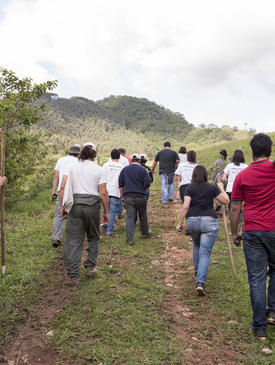Sustainable Production in the Cantareira System - Dairy Production Chain
Summary
The Cantareira System is located in São Paulo and Minas Gerais states and is one of the largest water systems on the planet. It has the capacity to produce 33,000 liters of water per second and is responsible for supplying water for more than 7.6 million people. In addition, the system is located in an important area of the Atlantic Forest that shelters many endangered species and connects two forest massifs, the Cantareira and Mantiqueira. However, these areas endure great pressure due inadequate land use: 59% of the total area are under anthropic use, usually degraded pastures. Within this context, IPÊ developed the "Sowing Water" project in the Cantareira System aiming to (i) influence farmers to adopt sustainable land use practices and to restore the forest that has been suppressed and (ii) involve, through environmental education, the community as a whole in the actions of the project.
Working in partnership with the "Sowing Water" project, ELTI has developed a field course for farmers that will train them on sustainable production and forest restoration. The course will focuse on farm management and the potential to increase productivity and add value to milk products. The training will take place in Nazaré Paulista, Piracaia and Bragança Paulista, at São Paulo state, where experts will present sustainable production systems to farmers and extensionists and help them develop a project for their own farms. The central topics are rural management, community association, valuing and commercializing dairy products, ecological pasture management, silvopastoral systems and forest restoration.
Content
This three-module course is spread over three weeks (one day per week).
Module 1: Rural management and production chain
June 12, 2019 – IPÊ, Nazaré Paulista, SP
- Cantareira System overview
- Planning and managing a rural property: cost control and productivity indexes
- Experience of those who have already added value to rural production: the case of “Capril do Bosque”
- Associativism or cooperativism: what is your path?
- Exercise: using data from participants’ farms
Module 2: Ecological pasture management
June 19, 2019 – Cravorana Farm, Piracaia, SP
- Ecological pasture management: increasing the number of animals
- Visit to farm areas with pasture management
Module 3: Silvopastoral systems
June 29, 2019 – Bragança Paulista, SP
- Silvopastoral systems: benefits and implementation
- Visit to a recently implemented area with silvopastoral systems
- ELTI’s experience in silvopastoral systems: Colombia and Panama
- Exercise: applying course concepts to a farm management plan


